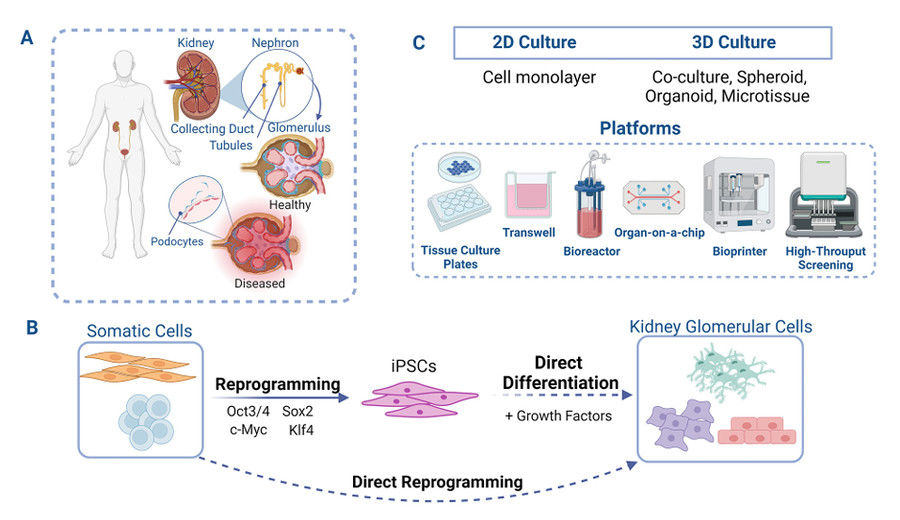Cell-based models offer reliable and reproducible methods for simulating mechanisms of disease processes and testing the effectiveness of drugs in vitro, which is helpful for the preliminary phases of the drug development process. In studying rare kidney diseases, cell-based models are highly relevant, as other methods of research may prove futile. With its unique understanding of rare kidney diseases, Protheragen has tailored cell-based model development services to address these conditions.
Cell-based Models for Rare Kidney Diseases
Cell-based models are essential in the research of rare kidney diseases as they disable the simulation of disease mechanisms and evaluate drug efficacy in vitro. The development of these models is now possible, thanks to recently developed techniques such as the use of primary patient-derived renal cells and immortalized cell lines which more accurately replicate the pathophysiology of rare kidney diseases. These models provide better insights into the disease processes, help identify novel biomarkers, and evaluate new therapeutic candidates. In working towards the development of novel therapeutic drugs to combat rare kidney diseases, these models are of vital importance.
 Fig.1 The process of creating kidney cell-based models using reprogramming, differentiation, and various culture platforms. (Barreto, Burt and Musah, 2019)
Fig.1 The process of creating kidney cell-based models using reprogramming, differentiation, and various culture platforms. (Barreto, Burt and Musah, 2019)
Applications & Advantages of Cell-based Models
Cell-based models are used to simulate rare kidney diseases by using human kidney cells grown in the lab. They allow researchers to study disease mechanisms, test potential drugs, and observe cellular responses to treatments in a controlled environment. These models are crucial for understanding disease progression and for developing new therapies targeting specific aspects of the disease.
Cell-based models provide a controlled setting where variables can be precisely manipulated, enhancing the reliability of results. They reduce the need for animal testing, addressing ethical concerns and lowering research costs. Additionally, using human cells increases the relevance of the findings to human conditions, and these models are suitable for high-throughput screening, speeding up the discovery of potential therapeutics.
Our Services
Protheragen has a unique focus: we provide a full range of services for the development of cell-based models to facilitate the study of rare kidney disorders. Applying the latest technologies, our team of skilled scientists and researchers develops and implements innovative cell-based kidney models, providing accuracy and precision throughout every step of the model development process.
Protheragen's Cell-based Models Development Services
Protheragen offers specialized kidney organoid model development services tailored to meet various research needs.
Cell-based Models Development for Various Rare Kidney Diseases
Drawing from our deep-rooted expertise, Protheragen offers a complete suite of services for the development of cell-based models for a given research area. With our extensive experience in kidney disease modeling, we are capable of tackling any kidney disease modeling challenge related to cell-based systems, ensuring the provision of precise, innovative, and bespoke solutions to help achieve your scientific objectives.
Why Choose Us?

Professional core technical team.
Advanced experimental equipment.
Empowering success through cooperation.
Strict quality control system.
At Protheragen, we are dedicated to offering comprehensive, one-stop preclinical development services, specializing in cell-based model for kidney disease research. From diseases model development to drug safety evaluation, our services support every stage of your research process. If you are interested in our services, please don't hesitate to contact us.
References
- Barreto, A. D., M. A. Burt, and S. Musah. "Advancing Drug Discovery for Glomerulopathies Using Stem-Cell-Derived Kidney Models." Trends Pharmacol Sci 44.4 (2023): 204-07.
- Garg, R., and A. Garg. "A Comprehensive Review on Recent Advances and Considerations for the Selection of Cell-Based in-Vitro Techniques for the Assessment of Permeability of Drug Molecules." Curr Drug Deliv 20.5 (2023): 526-44.
All of our services and products are intended for preclinical research use
only and cannot be used to diagnose, treat or manage patients.



 Fig.1 The process of creating kidney cell-based models using reprogramming, differentiation, and various culture platforms. (Barreto, Burt and Musah, 2019)
Fig.1 The process of creating kidney cell-based models using reprogramming, differentiation, and various culture platforms. (Barreto, Burt and Musah, 2019)


